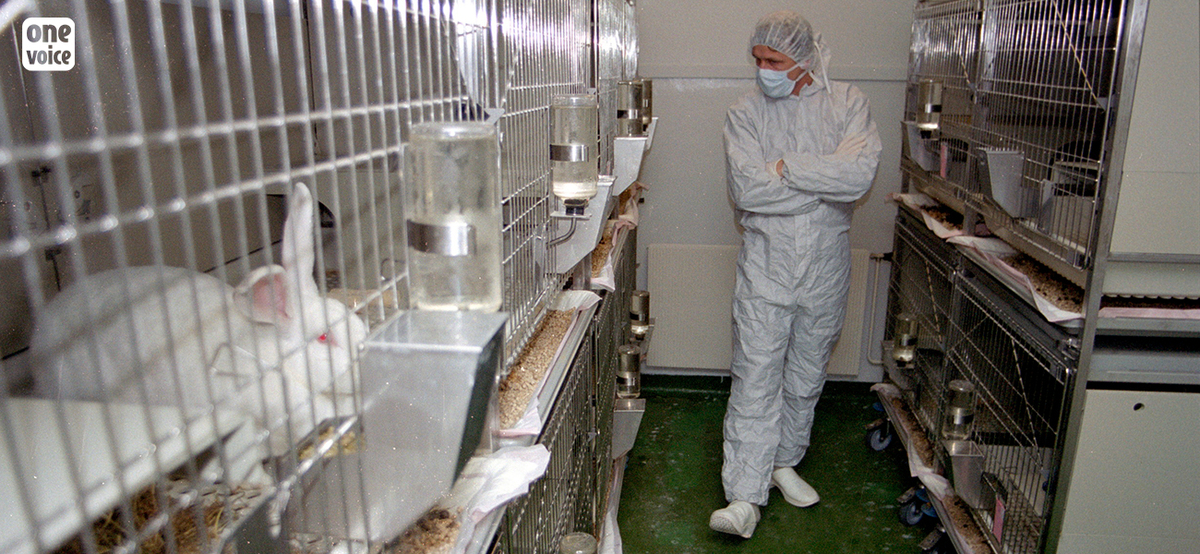

New Ipsos/One Voice survey: French people are largely against animal testing
The results of the Ipsos/One Voice survey from April 2023 that we are publishing are indisputable: French people are calling for an end to animal testing. In more detail, the results all go along the same lines. One Voice is delighted with such enthusiasm in favour of animals on the occasion of World Day for Animals in Laboratories (on 24 April). This shared opinion by French people gives hope to the idea of the European regulations being revised currently, and, with our daily commitment, we offer support to obtain true transparency on testing and on developments by non-animal methods industries.
Not only are the vast majority of French people against animal testing (three in four), but they are against it no matter what the products tested may be (medications, drugs, or even chemical products – such as household products or cosmetics), as well as the species of animals concerned. French people also support the development and exclusive use, when they exist, of non-animal testing methods. Finally, they are clearly calling for more transparency. More precisely still:
A strong opposition to the principle of animal testing
French people are very largely (74%) unfavourable towards even the principle of animal testing, 43% of those state that they are even completely against it. This opposition is not only a majority, but it is also growing strongly. In 20 years, it increased from 10 percent (comparison of results with those from a survey carried out by IPSOS for One Voice, by telephone, from 31 January to 1 February 2003, compared with a representative sample of the French population aged 15 and above).
A significant perception gap is shown between men and women. A higher proportion of women are generally against animal testing compared with men (85% versus 63%).
Beyond opposing the principle, clear support for a ban on certain practices linked with animal testing
In more depth, we see support for a ban on animal testing intended to test different types of products. This is the case for chemical ingredients or products (66% +11 percent vs 2003), harmful products consumed by humans such as tobacco or drugs (66%), or even still for medications (65%). Whatever the type of product on which they are questioned, French people support a ban on animal testing.
French people are also very widely in favour of an end to capturing and breeding animals destined for testing. The majority of respondents support the closure of breeding farms in France and for those destined for laboratories, whether it be dog breeding farms (85% support their closure) or primate breeding farms (80%). The capture of wild animals is also the subject of a significant rejection: 81% of French people support a ban on capturing primates in the wild in Asia and sending them to France to conduct experiments.
Support for a ban on animal testing which varies according to animal species, but which systematically remains a majority
The desire for a ban on animal testing varies according to the species on which the testing is carried out. Domestic animals elicit more desire for a ban (85% for dogs, 84% for cats), just like horses (84%) or primates (81%).
If the support for a ban on animal testing is lower for other animal species, this is still the case for a majority of respondents for insects (55%) or rodents (65%).
Whatever the species of animal, we note that women are systematically more favourable towards a ban on experiments than men, each time with a deviation of more than 10 percent (91% of women are also favourable of a ban on testing on dogs, versus 80% of men).
French people vote for the development of alternative methods in animal testing
Generally speaking, French people support the idea that we must look to develop alternative methods to animal testing so that we no longer have to inflict it upon animals (81% support this position versus only 19% who consider these experiments to be a necessity for human health). We note once again that women are the most critical of animal testing: 86% of them support the development of alternative methods while only 14% prioritise experiments for human health purposes.
When alternative methods exist, French people also want animal testing to be banned. 87% are in favour of this, of which 59% are even completely in favour. They also show great support (83%, of which 52% are completely in favour, up 12% versus 2003) for the implementation of an independent authority aiming to carry out checks that tests on animals are necessary and cannot be replaced with other methods.
In order to develop these alternative methods, they massively support a progressive transfer of public funds allocated for animal testing to scientific bodies who are developing research methods without animals (89% of French people are in favour, of which 54% are completely in favour).
In favour of alternative methods, French people support the authorisation of putting medication having been tested according to alternative methods to animal testing on the market (84% are in favour, of which 46% are completely favourable).
A call for transparency within animal testing
Almost 9 in 10 French people think that it is important that the consumer is informed on the existence of animal testing, when it took place, on products that they buy. 56% of them even consider this information to be very significant.
As well as this survey, One Voice is organising action to raise awareness throughout France and is publishing a very densely sourced report on the use of primates in laboratories, after their capture, breeding, and transport, and France’s major role in this international trade. A petition has also been made available
to the public to put a stop to this trade of long-tailed macaques, an endangered species that is particularly used in testing.
Download the graph results of the surveyDownload the results overview
Translated from the French by Joely Justice